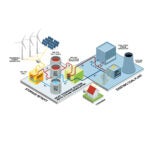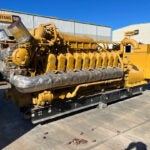Last week, as news emerged that the Kerry, Graham, and Lieberman draft bill is expected to be released on April 26—and it could hit Senate floor before July 4—the Institute for Policy Integrity hailed the Cantwell-Collins CLEAR Act. Meanwhile, the EPA received a two-week extension to a legally imposed deadline for proposing boiler standards.
Kerry, Graham, and Lieberman to Release Draft Bill April 26
The much-awaited compromise climate package proposed by Senators John Kerry (D-Mass.), Lindsey Graham (R-S.C.), and Joe Lieberman (I-Conn.) will reportedly be unveiled on April 26. The senators have been touting the bill as the best alternative to Waxman-Markey, the cap-and-trade bill that passed in the House last June.
Sen. Kerry has said that the bill will provide incentives for private investments in clean energy technologies and will increase gross domestic product by $111 billion over the next decade. Sen. Lieberman has said that the proposal will directly be handed to Majority Leader Sen. Harry Reid (D-Nev.) rather than formally introducing the bill—which would require review by all committees.
Sen. Reid has said that he hopes to bring the bill to the floor before the Congressional July 4 recess.
Sources: The Washington Post, Reuters
Report: Cap-and-Dividend Bill Would Spur Investment and Innovation
New York University’s School of Law’s Institute for Policy Integrity last week released a policy brief hailing a lesser-discussed climate-energy bill, the CLEAR Act, which has been sponsored in the Senate by Senators Maria Cantwell (D-Wash.) and Susan Collins (R-Maine).
The legislation proposes to place a price on carbon, auction 100% of the pollution permits, and refund most of the revenue back to consumers. The nonprofit think tank advocating better governmental decision-making in environmental law and other areas found in its brief titled "CLEAR and the Economy: Innovation, Equity and Job Creation" (PDF) that pricing carbon would spur investment and innovation in new energy technologies, giving a substantial boost to industries like manufacturing and construction—both hit hard in the recent financial crisis. It also suggests that relatively well-paying jobs would be generated in these sectors helping to mop up the slack created by the recession.
According to the brief, the auction and rebate in the CLEAR Act—its so-called “cap-and-dividend” proposal—could also create a buffer effect for Americans, shielding their pocketbooks from increases in energy prices. It finds through economic analysis that most taxpayers would break even or come out ahead under this plan. An added benefit of the rebate is that it helps smooth out regional disparities, it said. For example, after accounting for the rebate, the difference between the state with the highest payoff (Oregon) and lowest payout (Indiana) is only $91 per person per year.
Source: NYU Institute for Policy Integrity
EPA Receives Deadline Extension for Boiler and CISWI Proposals
The Environmental Protection Agency (EPA) on April 13 received an extension (PDF) of two weeks to the court-mandated deadline for proposing standards for industrial, commercial, and institutional boilers located at area and major sources of hazardous air pollutants under Section 112 and Commercial and Industrial Solid Waste Incinerators (CISWI) under Section 129.
The new deadline for the proposals is April 29, 2010 (it was to have been April 15, 2010). The EPA plans to issue a definition of nonhazardous waste under the Resource Conservation and Recovery Act (RCRA), which will have an impact on the boiler and CISWI rules. Though there is no court-mandated schedule for the RCRA definition, the agency plans to issue that proposal along with the boiler and CISWI proposals. The deadline for the final rules has not been extended and remains Dec. 16, 2010.
Sources: Sierra Club, EPA










